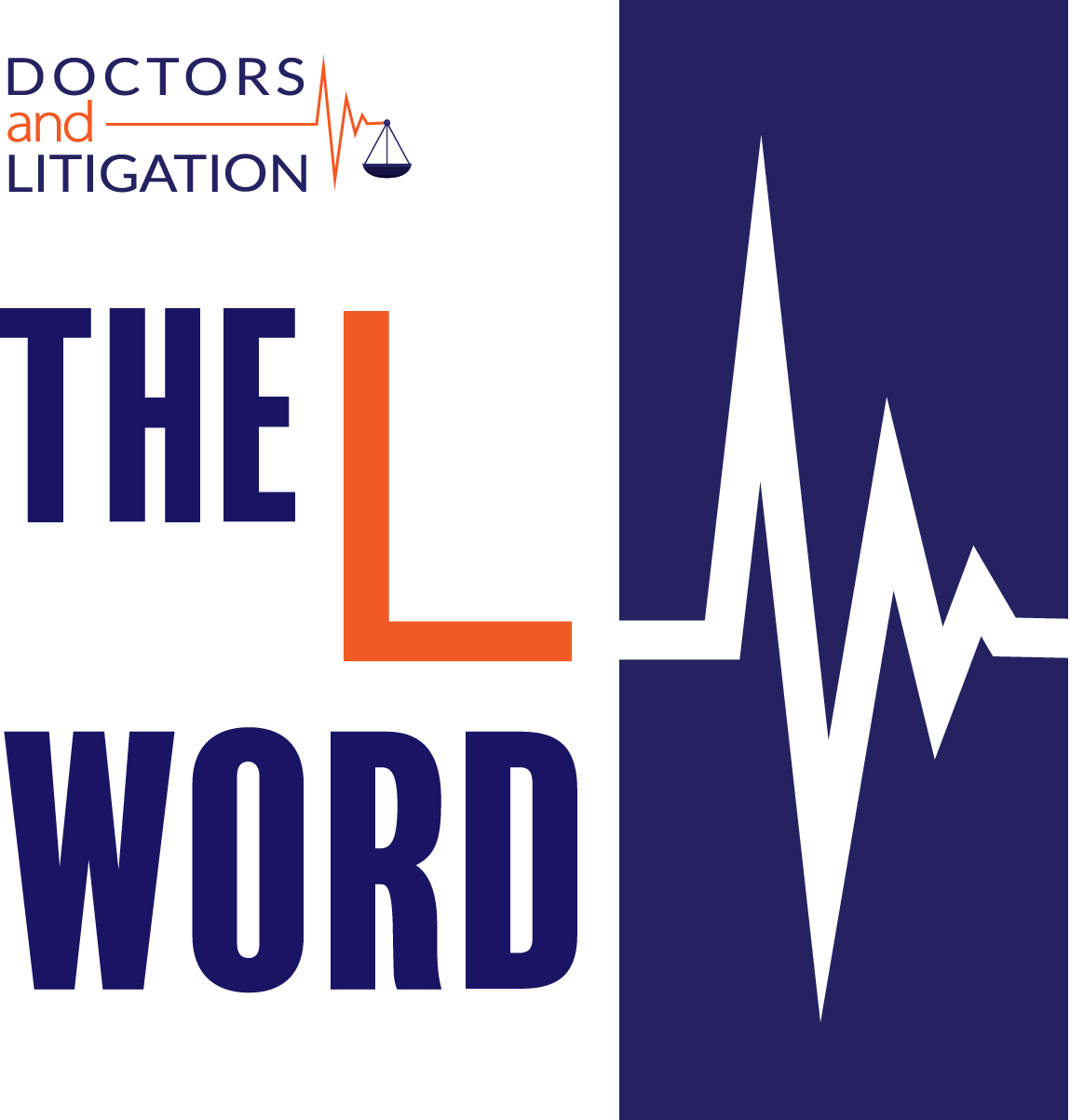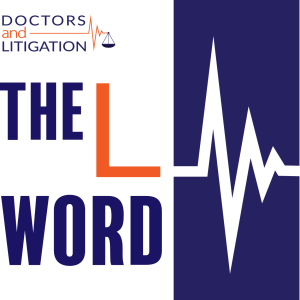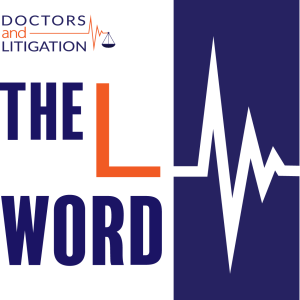
The majority of physicians will be sued during their career, yet the topic is largely taboo. This podcast for physicians discusses malpractice litigation and litigation stress, with the voices of doctors who have been through it. Music by @BenJamin Banger. Learn more about creator Gita Pensa M.D. at doctorsandlitigation.com Also available on Apple Podcasts and Spotify
Episodes

Friday Apr 05, 2019
Introduction: What’s the Big Deal?
Friday Apr 05, 2019
Friday Apr 05, 2019
Litigation affects the majority of physicians during their career -- in other words, good doctors often get sued. Yet the topic is largely a taboo one among physicians. In this first episode, Dr. Gita Pensa introduces the topic of litigation stress, interviews physicians who have been sued about what makes the experience difficult, and talks to Louise Andrew, MD JD about why this topic needs to be addressed.
Dr. Pensa successfully defended a multi-million dollar malpractice case spanning twelve years, including two jury trials. She speaks nationally on the topic of litigation and litigation stress, and has been a practicing physician for nearly 20 years. She is currently academic faculty at the Alpert Medical School of Brown University. However, these opinions are her own, and this podcast does not express the views of Brown University, her employers, or any affiliated hospital systems.
More about Dr. Pensa: doctorsandlitigation.com
Also available here on Apple podcasts.
Theme music by BenJamin Banger (Instagram: @BenJaminBanger)

Thursday May 09, 2019
First Steps: You‘ve Been Served
Thursday May 09, 2019
Thursday May 09, 2019
In the second episode of Doctors and Litigation: The L Word, we discuss the very first steps in litigation, starting with when you are given notice of a medical malpractice lawsuit. Experts Dr. Sara Charles, Dr. Ilene Brenner, and Dr. Louise Andrew lend their expertise; physician voices describe their experiences.
More about author Dr. Pensa: doctorsandlitigation.com
Topics discussed:
- The emotional impact of the first steps into litigation (and the intended effect from the plaintiff's attorneys), as well as some advice on how to frame it in your mind
- First action basics: contacting your insurance carrier, and finding an attorney to represent you
- Board of Licensure/Department of Health investigations that begin automatically in some states when litigation starts
- The beginnings of the 'discovery' process
- Who to talk to...and who not to talk to
- Do's and definite don'ts in the first stages
Resources mentioned:
"How to Survive a Medical Malpractice Lawsuit", by Ilene Brenner MD
"Adverse Events, Stress and Litigation: A Physician's Guide", by Sara Charles, MD and Paul Frisch, JD
Litigation stress website with free resources: www.physicianlitigationstress.org (founded by Dr. Sara Charles; note host Gita Pensa MD serves on the voluntary advisory board)
Dr. Louise Andrew, MD JD: www.mdmentor.com
Theme music by BenJamin Banger (Instagram: @BenJaminBanger)

Friday Jun 14, 2019
Stark Choices: The Case of Dr. V
Friday Jun 14, 2019
Friday Jun 14, 2019
In this third episode, you'll hear the story of one tragic medical case and its legal aftermath, involving a physician who did everything right -- and yet winds up as a defendant in a high-stakes malpractice trial.
More about author Dr. Pensa: doctorsandlitigation.com

Wednesday Jul 24, 2019
Darkness Into Light: Suicide, Coping, and Hope
Wednesday Jul 24, 2019
Wednesday Jul 24, 2019
In this fourth episode, we first hear the story of Dr. J, an accomplished OB Gyn who died by suicide during litigation in the aftermath of the death of his patient. We then talk about barriers to physicians seeking help, and how peer support programs can act a a lifeline. And we talk to a psychologist with expertise in physician litigation about some techniques and strategies for coping with litigation stress.
If you are in crisis, the National Suicide Prevention Hotline at 1-800-273-8255 is there for everyone -- even healers.
More about Dr. Pensa: doctorsandlitigation.com

Wednesday Sep 11, 2019
L Word Mini: NPSA Day
Wednesday Sep 11, 2019
Wednesday Sep 11, 2019
In follow up to the fourth episode, which tells the story of Dr. J, a physician who died by suicide during medical malpractice litigation, this mini session highlights National Physician Suicide Awareness Day (NPSA Day) which falls on September 17th. This is during Suicide Prevention Month, and one week after World Suicide Prevention Day. Physicians have an increased risk of suicide over the general population; over 300 physicians die by suicide each year. I speak with Dr. Loice Swisher, co-founder of NPSA Day, tells us about its origins and ways that you can get involved.
Follow hashtags #NPSADay, #DocsTalkSuicide, and for general suicide prevention, #BeTheOne or #BeTheOneTo.
The fifth regular episode on the deposition will be out later this month.

Wednesday Sep 25, 2019
D-Day: Preparing For Your Deposition
Wednesday Sep 25, 2019
Wednesday Sep 25, 2019
In this episode, we discuss the need for emotional, psychological, and practical preparation for your deposition. We hear from experts such as defense attorney Ryan Deady (of Barton Gilman, LLP) as well as Dr. Ilene Brenner, author of 'How to Survive a Medical Malpractice Lawsuit.' As always, you'll hear from physicians about their experiences as well. (Note: this is not concrete legal advice -- you need your lawyer for that. This is meant as a general guide to the process and what you might expect, but just like in medicine, every legal case is unique.)
More about Dr. Pensa: doctorsandlitigation.com
PRIOR TO DEPOSITION: In addition to obtaining books and discussing with your attorney, you may find these points helpful. This is not comprehensive, but it's a start.
1) Study your chart well, and any other documents provided to you by your attorney. 2) Discuss whether to do any research about the medicine in question with your attorney -- there are pros and cons to this. 3) Know the weak spots in your case and your charting, and how you will articulate your thoughts about them 4) Practice answering difficult questions in a direct and succinct manner, avoiding providing extraneous information. 5) Discuss with your attorney how to handle questions about co-defendants. In general, avoid finger-pointing. 6) Know your 'arrows' and when to fire them (i.e., if you have a 'slam dunk' in your defense)--this is the exception to the 'don't explain too much' strategy. Your attorney will help you identify these points and how to get them into your testimony. 7) Plan for the day itself: make sure you're not on call or post-overnight, know what sharp, professional outfit you will be wearing, know where to be and when -- and plan something fun and relaxing that evening to decompress after it's done.
DURING DEPOSITION: 1) Pay attention to your attorney during the process -- they are with you for a reason. 2) Take your time answering questions; pause before speaking. 3) Do not answer any question until the question is complete. Do not interrupt or speak to fill in an awkward pause. 4) If a question has multiple parts or is confusing, ask the questioning attorney to break it down or rephrase it. Do not answer questions unless you know exactly what the question is. If the question seems out of 'left field' avoid over-explaining why it seems to be so. If you cannot answer the question as it's asked, say so and ask them to rephrase it. 5) Be aware of verbal traps such as double negatives, hypotheticals, overly vague questions or generalizations, or questions posed after a long series of statements or data. 6) If you don't remember or don't know, just say you don't remember or you don't know. Don't guess, and don't say anything you only 'think' you remember. Stick to what you're sure of. 7) Do not agree to calling any text, journal or article "authoritative". It's not. 8) You should look at hard copies of the chart or labs when asked direct questions about them -- but then stop flipping through the chart and pay attention to the next question. Do not direct their attention to any other parts of the chart or try to educate them. 9) Take a break whenever you need one. Refresh, recharge, and speak with your attorney in private. It's a long day. 10) When it ends, get far away from the building and into a safe space before you talk to your attorney about what went on in there. You never know who's listening, and anything they observe is fair game, even if it's not in the transcript.

Wednesday Oct 30, 2019
Experts and Testiliars: Part One
Wednesday Oct 30, 2019
Wednesday Oct 30, 2019
In part one of this look at medical experts in malpractice litigation, we hear the story of Dr. M, a physician embroiled in a dramatic legal battle after the death of a patient, and his efforts to bring the medical expert in his case to justice. We speak more with Dr. Louise Andrew, MD JD, about the necessity and ethics of medical expert testimony, and hear the voices of physicians who have been defendants, plaintiffs, and experts themselves. And we examine the psychological impact that unethical, exaggerated, or misleading expert testimony has on defendant physicians, including the story of a physician who died by suicide after being accused of witness tampering.
More about Dr. Pensa can be found at www.doctorsandlitigation.com.

Friday Dec 13, 2019
Experts and Testiliars: Part Two
Friday Dec 13, 2019
Friday Dec 13, 2019
In Part Two of 'Experts and Testiliars' we continue to explore the world of unethical medical expert witnesses and their impact on defendants and the litigation system. You'll hear a presentation of Dr. Pensa's own malpractice case, as well as verbatim expert witness testimony from her second trial (acted out brilliantly by Dr. Anand Swaminathan as the plaintiff's expert). We also discuss what physicians can do to help attorneys identify and disempower 'testiliars' during litigation, what 'standard of care' actually means, and what recourse physicians can take after their case is completed if they feel they have been wronged by an unethical expert.
Louise Andrew MD JD, Greg Henry MD, and Jeff Segal MD JD add their expertise.
More about Dr. Pensa can be found at doctorsandlitigation.com.

Sunday Jan 19, 2020
When Litigation Hits Home: Relationships and Litigation Stress
Sunday Jan 19, 2020
Sunday Jan 19, 2020
"Every member of the family is involved in a lawsuit." -Dr Greg Henry
Litigation often has a spillover effect on spouses/partners and families, whether or not the defendant physician acknowledges it. In this episode, I interview Dr. Claire Nicogossian, PsyD, a psychologist and clinical instructor in the Department of Psychiatry and Human Behavior at Brown University (www.MomsWellBeing.com) We discuss common struggles that couples and families face during litigation, how to stay connected and communicative, and how to speak with children about litigation. Dr. Nicogossian describes some of the Gottman Institute's longitudinal research on couples, including the 'Four Horsemen of the Apocalypse' in relationships that predict divorce/relationship failure (Criticism, Contempt, Stonewalling, and Defensiveness). She offers some practical advice, reassurance, and insight. Drs. Paccione, Andrew, and Henry, introduced in previous episodes, continue to offer their added insights.
More about Dr. Pensa can be found at doctorsandlitigation.com.

Friday Mar 13, 2020
Trial and Settlement
Friday Mar 13, 2020
Friday Mar 13, 2020
In this episode, we're on the road to trial -- and talking about settlement opportunities that may come up along the way. Who makes the decisions about going to trial vs offering/accepting a settlement? What factors go into those decisions? What's a consent to settle agreement -- and what's the hammer clause that comes with it?
If you're definitely headed to trial, how do you prepare -- practically and psychologically? And what can happen if there's a verdict against you and a judgment that exceeds your policy limits?
We'll be hearing from two defense attorneys, Dr. William Sullivan (a practicing physician and attorney, who has been a defendant himself) as well as Douglas Williams, Esq, a medical malpractice defense attorney in Baton Rouge, LA, with over 30 years of experience. We'll also hear the story of one physician's case as it progresses from medical encounter all the way to trial.
More about Dr. Pensa and her work can be found at doctorsandlitigation.com
